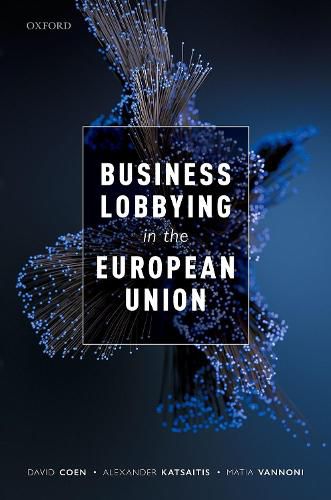Readings Newsletter
Become a Readings Member to make your shopping experience even easier.
Sign in or sign up for free!
You’re not far away from qualifying for FREE standard shipping within Australia
You’ve qualified for FREE standard shipping within Australia
The cart is loading…






At a time when Europe and business stand at crossroads, this study provides a perspective into how business representation in the EU has evolved and valuable insights into how to organize lobbying strategies and influence policy-making. Uniquely, the authors analyze business lobbying in Brussels by drawing on insights from political science, public management, and business studies. At the macro level, we explore over 30 years of increasing business lobbying and explore the emergence of a distinct European business-government relations style. At the meso level, we assess how the role of EU institution, policy types, and the policy cycle shape the density and diversity of business lobbying activity. Finally, at the micro level we seek to explore how firms organize their political affairs functions and mobilized strategic political responses. The study uses a variety of methods to analysis the business government relations drawing on unique business and policy-maker surveys; in-depth case studies and elite interviews; large statistical analysis of lobbying registers to assess density and diversity across policy areas and EU institutions; and managerial career path and organizational analysis to assess corporate political capabilities. In contributing to discussions on corporate political strategy and interest groups activity, this monograph should be of interest to public policy scholars, policy-makers, and businesses managers seeking to understand EU government affair and political representation.
$9.00 standard shipping within Australia
FREE standard shipping within Australia for orders over $100.00
Express & International shipping calculated at checkout
At a time when Europe and business stand at crossroads, this study provides a perspective into how business representation in the EU has evolved and valuable insights into how to organize lobbying strategies and influence policy-making. Uniquely, the authors analyze business lobbying in Brussels by drawing on insights from political science, public management, and business studies. At the macro level, we explore over 30 years of increasing business lobbying and explore the emergence of a distinct European business-government relations style. At the meso level, we assess how the role of EU institution, policy types, and the policy cycle shape the density and diversity of business lobbying activity. Finally, at the micro level we seek to explore how firms organize their political affairs functions and mobilized strategic political responses. The study uses a variety of methods to analysis the business government relations drawing on unique business and policy-maker surveys; in-depth case studies and elite interviews; large statistical analysis of lobbying registers to assess density and diversity across policy areas and EU institutions; and managerial career path and organizational analysis to assess corporate political capabilities. In contributing to discussions on corporate political strategy and interest groups activity, this monograph should be of interest to public policy scholars, policy-makers, and businesses managers seeking to understand EU government affair and political representation.